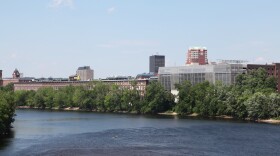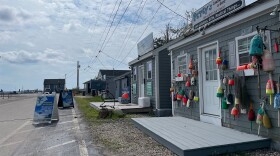Many Granite Staters go fishing for that feeling of getting back to nature. Some of those hopeful for a catch succeed in part because those lakes and ponds may have been stocked with fish by the Fish and Game Department.
Granite Geek David Brooks of The Concord Monitor spoke with All Things Considered host Peter Biello about this decades-old practice of dropping trout from helicopters into remote ponds in New Hampshire.
(This transcript has been lightly edited for clarity.)
So is that basically how it works? They load up a helicopter with fish and then drop them into a pond.
Yeah, they raise them, there are six state fish hatcheries. There's one national fish hatchery and there's a couple of private ones that I know of. So there's fish that are raised and at certain ages, depending on the pond and whatever their goals are, they put a bunch of them in a tank and take them up in a helicopter and dump a set amount of them out into the water body. And they stick them in these remote ponds and there they live and grow, and you come and try and catch them.
What is the environmental impact of putting fish in ponds like this?
Well that's a good question. Off the top of your head those of us who like nature, we'd say “Gee, what a terrible idea.” You know, taking all these artificially raised fish and spreading them around.
We're talking in this case about eastern brook trout which are native to New Hampshire, it's our state fish. But even that is a little complicated because human beings have been moving fish, and particularly fish we like to catch, from water body to water body for many, many, many decades. And it was often done in the past rather haphazardly, informally and so various species of trout can interbreed. So there's a question really, even a brook trout, how much of a brook trout it is and how much it might have some other genetics in there.
So you're taking these fish that may or may not be truly native, and you're putting them in ponds where they wouldn't get there naturally. So that seems like a bad idea. On the other hand I think you can make the argument, in fact I do in my column, that it's way too late to worry about it. Because we've been doing this for so long that there really is no natural ecosystem in virtually any water body in New Hampshire and in most of the industrialized world anymore. I'd go further and say there is no natural anything.
Tell us a little bit about the incentive for the state to do this because quite a few people hope to catch a fish here in New Hampshire, whether they're residents or nonresidents.
Roughly 150,000 fishing licenses are sold each year. Some of them are sold with hunting licenses and there are various different categories. So there's a lot of people who like them, it brings in six million bucks or so, plus or minus, to the state.
This money is used for a variety of Fish and Game activities, including conservation. So it's a good thing even if you're not a fishing person, even if you're not an angler. People who liked to fish really liked to fish and the idea of hiking to a really remote pond and catching a 10 inch, 12 inch trout is just a thrill almost beyond measure for many people.
So what would anglers expect to catch if the state didn't routinely stock these ponds with trout?
Well that's a good question and part of the reason that the stocking ever began is because anglers wanted to catch things. So, presumably, a truly remote pond that had never been stocked is very unlikely to have much of a fish population. If you want to hike to a pond and catch something, you have a much better chance if the state has stocked it, which is why the state stocks them.
That's David Brooks. He's a reporter for The Concord Monitor and the writer who took to writing about geeky things like a fish to water at GraniteGeek.org.









